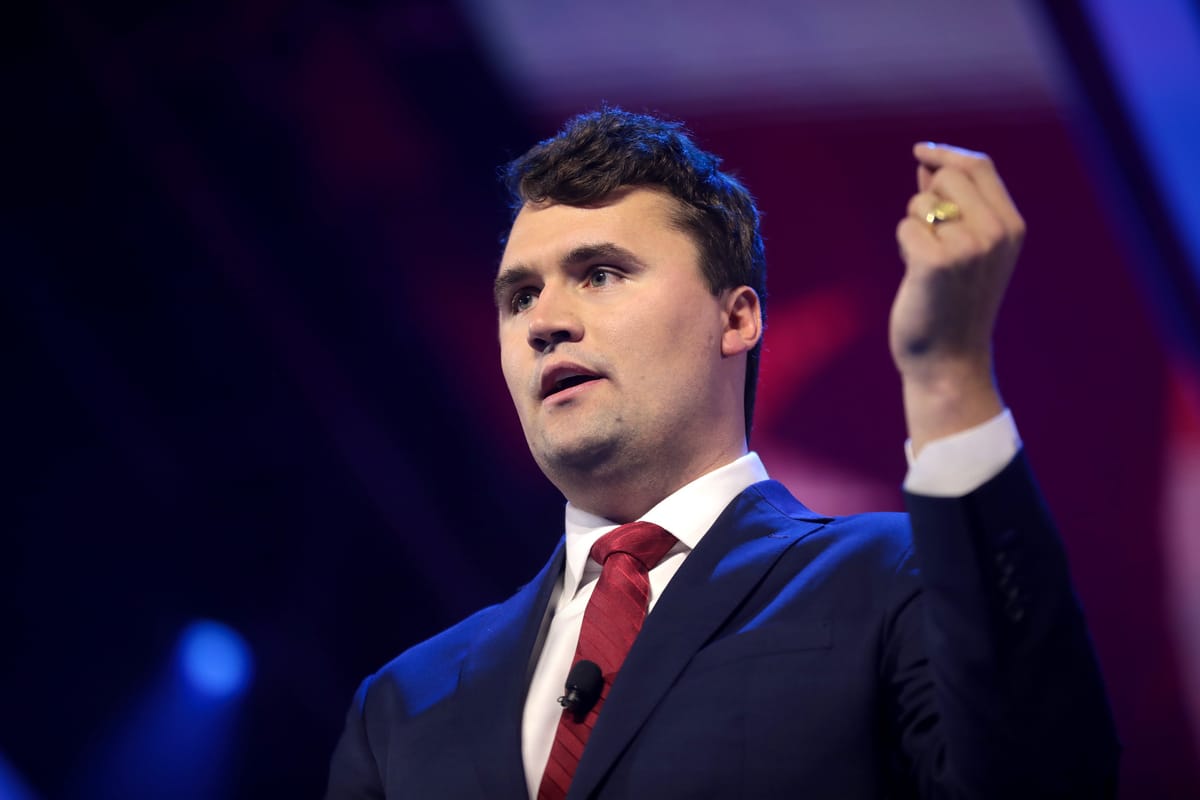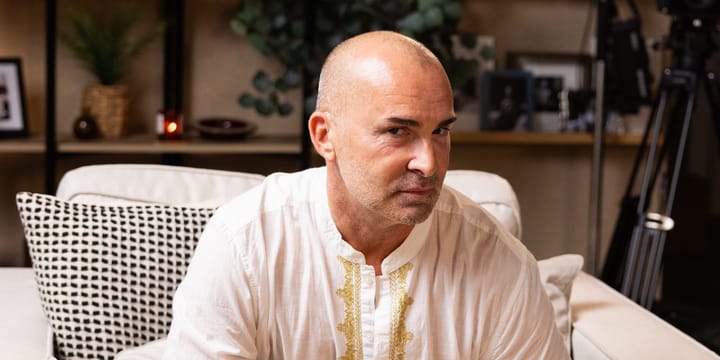What Charlie Kirk’s death tells us about rhetoric, extremism and risks for LGBTQ+ people
Charlie Kirk’s assassination is a tragic reminder of spiralling political violence. His anti-LGBTQ+ rhetoric was deeply harmful, yet celebrating his death is wrong. We must turn down the heat before words breed more violence.

In the aftermath of Charlie Kirk’s assassination, grief and outrage clash. Regardless of one’s political views, the killing of a young political figure signals a dangerous escalation.
For LGBTQ+ communities already living in environments of hate, marginalisation and fear, this moment has particularly stark implications. Rhetoric that demonises trans people and queerness does more than hurt feelings; it acts as a spark in a volatile environment.
If we want to understand the severity of the problem, it is helpful to compare what is happening in the US with patterns in Europe, as this sheds light on how rhetoric is becoming a prelude to violence and how communities suffer.
The broader picture: political violence in the U.S.
To understand the risk here, it’s worth looking at what data tell us about politically motivated violence, including who commits it and how frequent it is.
- A recent piece in Reuters reports that over 300 political violence incidents have been identified by Reuters in the US since MAGA loyalists and far-right activists stormed the Capitol on 6 January 2021. These incidents include assaults, threats and targeted political attacks.
- A University of Maryland / START study (LaFree et al.) comparing extremist behaviour finds that right-wing extremist actors are significantly more likely to commit violent acts than left-wing ones.
- Globally, left-wing extremist violence appears less lethal on average than right-wing extremist violence—both in the U.S. and worldwide. For example, the same UMD study showed that while both Islamist and right-wing extremist groups in the U.S. have similar propensities for violence, left-wing extremist groups commit fewer violent acts and fatalities.
In Europe, data is more fragmentary but points to far-right actors increasingly legitimising hostile rhetoric toward LGBTQ+ people, migrants and “gender ideology." In many countries, anti-LGBTI hate crime is rising, accompanied by political party platforms or laws that explicitly or implicitly target trans people or ban gender identity topics in schools.
ILGA-Europe reports a sharp rise in both hate speech and bias-motivated violence against LGBTI people across Europe & Central Asia. Governments and political figures in many countries are openly weaponising homophobia / transphobia.
In France in 2023, anti-LGBT+ offences rose by 13% versus 2022 (4,560 incidents), with serious offences (violence & threats) rising ~19%. Victims are disproportionately young, often male, many under 20.
So: yes, political violence is rising, and yes, the data so far suggest that right-wing extremism is a more frequent source of lethal political violence than left-wing extremism. That does not absolve any group of responsibility for inflammatory rhetoric, threats, or marginalisation; but it helps to push back against claims that “the left” or "trans people" are equally culpable in terms of violence.
In fact, the data should enable us to refute the distorted picture that some political figures attempt to portray here in the UK and elsewhere, in order to exploit volatile situations such as the current one.
Charlie Kirk’s legacy on LGBTQ+ rights, and what he said
To properly situate this moment, one has to reckon with Kirk’s record:
- He argued that there is an "LGBTQ agenda" and strongly opposed same-sex marriage.
- He cited Leviticus 20:13 ("If a man lies with a male as with a woman… they shall surely be put to death…") as "God’s perfect law when it comes to sexual matters."
- He rejected gender-affirming medical care for transgender people, arguing that there are only two genders. He frequently used the term "transgenderism" and claimed that gender fluidity is a lie that harms people.
- He promoted the idea of burning Pride flags in public, and opposed "LGBTQ-inclusive education."
Not only were his inflammatory comments focused on LGBTQ+ people, but on race and women too.
If you’re a WNBA, pot-smoking, Black lesbian, do you get treated better than a United States marine?
– The Charlie Kirk Show, 8 December 2022
Happening all the time in urban America, prowling Blacks go around for fun to go target white people, that’s a fact. It’s happening more and more.
– The Charlie Kirk Show, 19 May 2023
We need to have a Nuremberg-style trial for every gender-affirming clinic doctor. We need it immediately.
– The Charlie Kirk Show, 1 April 2024
The American Democrat party hates this country. They wanna see it collapse. They love it when America becomes less white.
– The Charlie Kirk Show, 20 March 2024
These are not fringe statements. Platforms such as Turning Point USA (which he founded in 2012 after dropping out of high school), his podcast The Charlie Kirk Show, and college tours have given him a wide audience, particularly among younger right-wing and conservative activists.
He is a household name, particularly among Gen Z voters. He has amassed 5.7 million followers on X and 8.8 million on TikTok. Whatever he said set the tone for debates.
His words have often contributed to a culture in which LGBTQ+ people are blamed, marginalised and sometimes dehumanised.
The danger of rhetorical escalation and false blame
What is deeply worrying is the rapid attempt to assign blame to Democrats, progressives and even the trans community in the aftermath of this assassination, despite a lack of evidence.
Media reports note that soon after the shooting, there were claims by MAGA activists and in pro-Trump circles that the “radical left” was responsible. Experts warn this kind of blaming inflames tensions and can lead to a “vicious spiral” of retaliatory violence.
🚨Turns out the report that the bullets used by Charlie Kirk’s shooter had “transgender and anti-fascist ideology” has NOT been verified by A.T.F. analysts and did not match other summaries of the evidence. Important to rely on factual info here. pic.twitter.com/AeuLMFtjZd
— Harry Sisson (@harryjsisson) September 11, 2025
Donald Trump himself issued a statement condemning political violence and escalating rhetoric — only to then accuse the 'radical left' of Charlie Kirk's murder. During moments of crisis, presidents set the scene, and most US presidents throughout history have sought to unify and bring the nation together. Not this one, though.
When political violence enters the conversation, unverified accusations can be particularly harmful. They feed into existing fears and polarisation and can even inspire copycat behaviour. Further, when LGBTQ+ people are blamed for societal or political issues, as sometimes occurs in far-right discourse, they become potential targets. In an already hostile environment, scapegoating can cause real harm, even without proof.
President Trump shares a message on the assassination of Charlie Kirk.
— The White House (@WhiteHouse) September 11, 2025
“I ask all Americans to commit themselves to the American values for which Charlie Kirk lived & died. The values of free speech, citizenship, the rule of law & the patriotic devotion & love of God.” pic.twitter.com/3fBSgs4Zxa
What the LGBTQ+ lens adds
Looking at this through an LGBTQ+ perspective, several issues become acute:
- Vulnerability to hate and violence: LGBTQ+ people already face disproportionate violence, both interpersonal and systemic. Rhetoric that portrays them as dangerous, immoral or part of a conspiracy fosters an environment that can lead to actual violence.
- Erosion of rights and normalisation of hostility: When public figures promote anti-trans or anti-LGBTQ+ beliefs, it legitimises policies (laws against trans care, bans on LGBTQ+ books or curricula, opposition to anti-hate protections). Even without violence, harms accumulate.
- Accountability in public discourse: For communities already marginalised, words matter. The kind of dehumanising or absolutist rhetoric that Charlie Kirk used contributes to stigma and exclusion, which in turn can lead to mental health issues, denial of services, and more.
Conclusion: grief, responsibility, hope
Even if many of his statements were deeply hurtful or harmful, especially to LGBTQ+ people, Charlie Kirk’s death is a tragedy. In a just society, nobody should be killed because of their beliefs, politics or identity. Celebrating his death crosses a moral line, even for those who opposed his views.
Everyone must pause. Reflect on how words can lead to action. Consider not only the culpability of the shooters, but also that of the culture which sees the demonisation of 'the other' as acceptable.
The upcoming US mid-term elections and the mayoral and local elections in the UK next year are set to be the ugliest and most dangerous elections we have ever seen.
Political parties and politicians across the spectrum now have a responsibility to tone down their rhetoric, especially those who offer simple solutions to complex problems. They need to reassess whether the cost of scapegoating entire communities has become too high, even for them.
We need cooler heads. A return to public debate grounded in facts, mutual respect (yes, even when we disagree), and humility. Otherwise, this aggression, this rage, this reactive violence, will only escalate. And the price will be paid not just in politics, but in lives.
More sources:
- Reuters – Nation on edge: Experts warn of vicious spiral of political violence after Kirk killing (11 Sept 2025)
- ACLED – Radical Group Violence on the Rise in the EU (2023)
- AP News – German police report record number of politically motivated crimes in 2023 (7 May 2024)
- Reuters – France anti-LGBT+ offences rose 13% in 2023 (16 May 2024)
- European Parliament Research Service – Attacks on the rule of law and LGBTIQ rights in the EU (2023 briefing)
- The Guardian – Far right weaponising LGBTQ+ rights in Europe to sow division, campaigners say (1 June 2025)
- Image: “Charlie Kirk” by Gage Skidmore, CC BY-SA 2.0





Comments ()